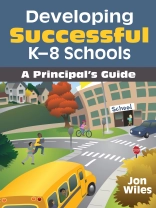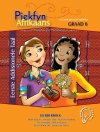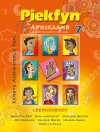‘The return to K–8 schools is an opportunity to step back, be purposeful and thoughtful, and plan for what we want for young persons in our schools. This book provides the vision and the tools we need to plan and build something better in Grades K–8.’
—Heather Mac Taggart, Executive Director
Classroom Connections, Ontario, Canada
A how-to guide for developing or transitioning to a K–8 school!
The K–8 model for school design has gained popularity with educators and parents for demonstrating higher student achievement, fewer behavioral problems, and increased cost effectiveness. This comprehensive guide provides school leaders with the tools to develop and implement a sound plan for creating an exemplary K-8 school or transitioning successfully to the K–8 approach.
Developing Successful K–8 Schools offers strategies for designing curriculum aligned to state standards, promoting 21st-century skills, planning instruction, and evaluating an effective K–8 program. Readers will also find:
- Ten proven instructional methods for meeting the learning needs of K–8 students, plus examples that illustrate how to apply the strategies and deal with problems that might arise
- Student assessment techniques and record-keeping procedures
- Implementation tools such as checklists, activity charts, and much more!
This resource is ideal for school leaders who want to articulate a clear vision for a K–8 school and stay on the cutting edge of educational excellence and student achievement.
Jadual kandungan
List of Figures
Preface
Acknowledgments
About the Author
1. Here Comes the K-8 School
Origins of the New K-8 School
Rationale for Changing the School Design
Bedrock Beliefs About Educating Children
An Initial Look at the New K-8 Program We Need
Some Issues Associated With K-8 Education
Questions for Study Groups
Summary
Notes
2. Using Standards to Define K-8 Programs
Origin of Standards
National Standards for K-8 Education
Subject Matter Standards in K-8 Schools
Extending Standards in K-8 Schools
Learning Targets for Standards-Based School
Managing Standards-Based Programs
Nurturing Intellectual Competence
Transfer of Knowledge
Questions for Study Groups
Summary
Notes
3. Using Skills to Create the Seamless Curriculum
Two Conceptions of Ends
The Curriculum Design Tasks
What Kind of Skills Should be Taught?
Sample Tasks for Each Learner
Collaborative Emphasis
A Final Word About the Subjects
Questions for Study Groups
Summary
Notes
4. New Instructional Patterns for the K-8 School
General Design
Organization Patterns
Modifying Standards-Based Curriculum
New Uses of School Buildings
New Deployment of Teachers
New Ways of Assessing Students
New Patterns for Involving Parents
Questions for Study Groups
Summary
Notes
5. A Return on Investment
Parents
Students
Teachers
Administrators
Questions for Study Groups
Summary
Notes
6. Implementing the K-8 Program
The Unfolding Process
Prerequisite Conditions
Acquiring Resources
Assessment
Putting It All Together
Questions for Study Groups
Summary
Notes
7. Validating Progress
Concept Development
Mission Statements
Curriculum Design
Instructional Features
Teachers
Parents
Facilities and Transportation
Technology
Resource A. Summary of K-8 Research Findings
Resource B. Standards Organizations
Resource C. Instructional Resource Sites on the Internet
Resource D. Teaching Through the Internet
Resource E. Glossary
References
Index
Mengenai Pengarang
Jon Wiles is a highly experienced educator who has provided curriculum leadership to schools and educational agencies for over thirty years. His specialty is the creation and implementation of curriculum plans. Wiles’s work as an educational consultant has taken him to hundreds of agencies in more than forty states and a dozen foreign nations in Europe, Asia, Africa, and the Caribbean.Wiles is the author or coauthor of twelve widely used books addressing curriculum and educational leadership. His text, Curriculum Development: A Guide to Practice (Seventh Edition), has been used for nearly thirty years in colleges and universities throughout the world to train curriculum leaders. Other areas of publication by Wiles include teacher training, administration, school supervision, theory of change, politics of education, middle grades education, and technology.












